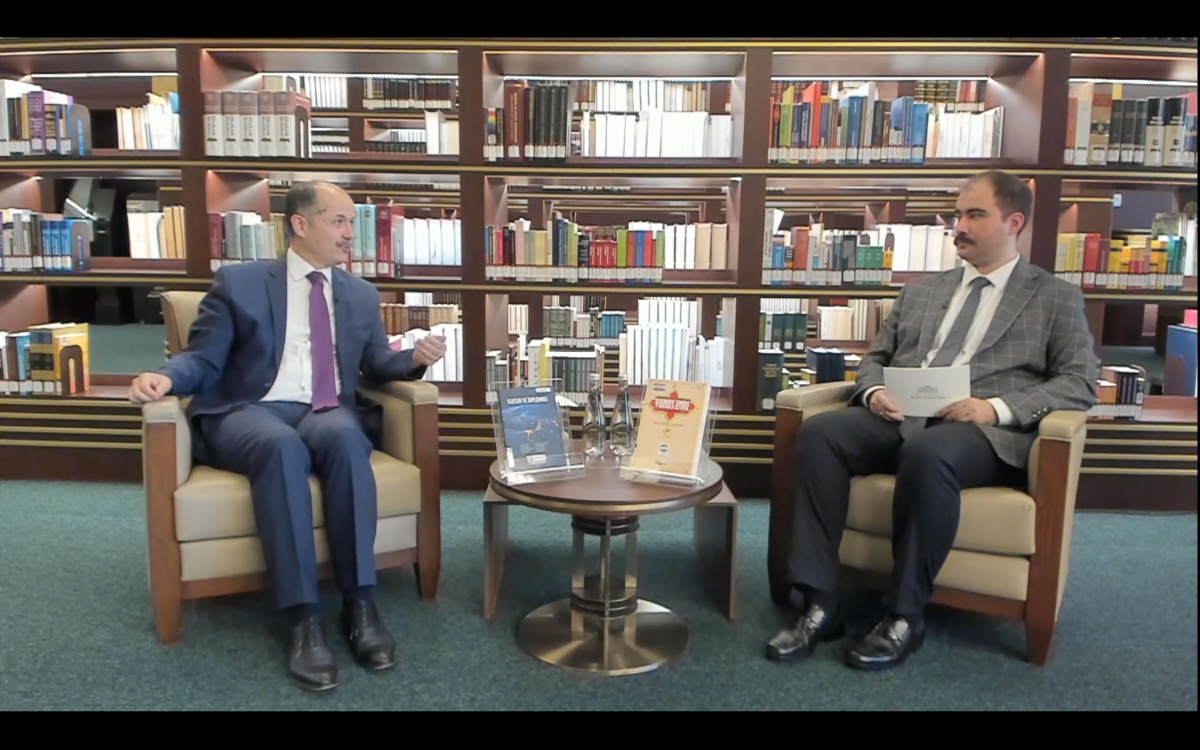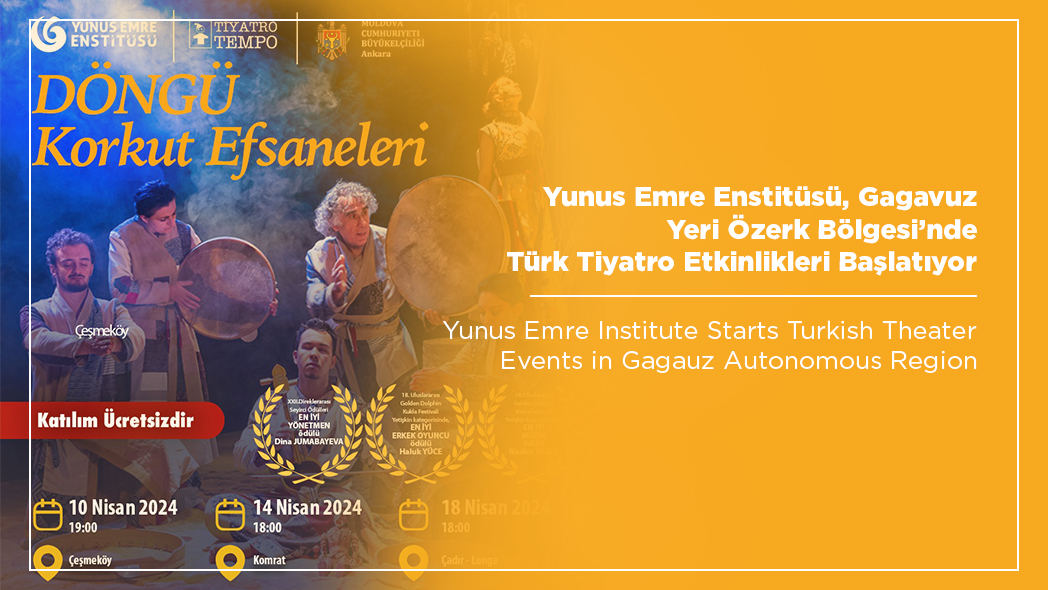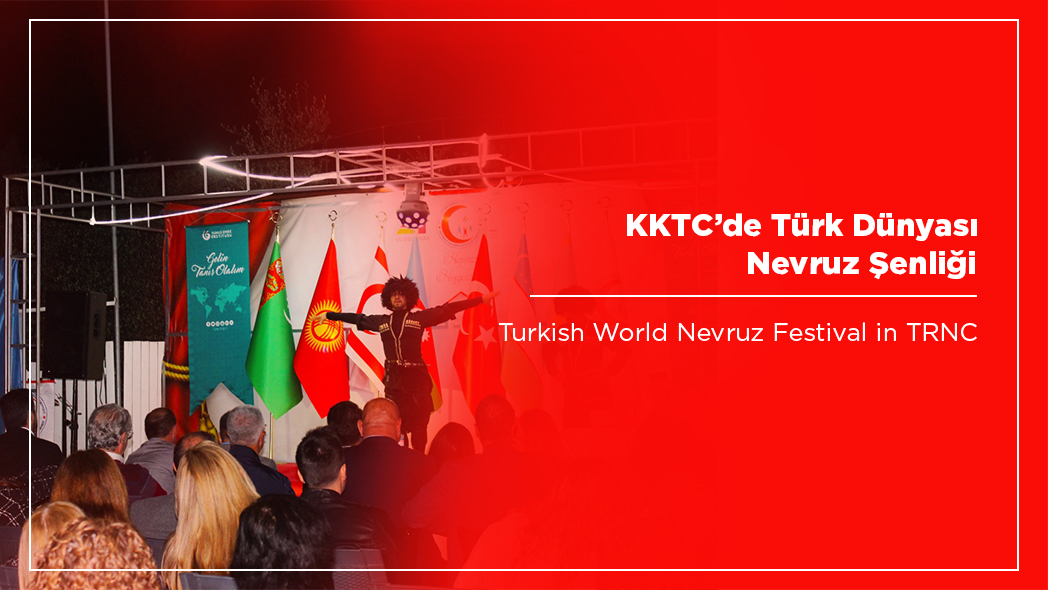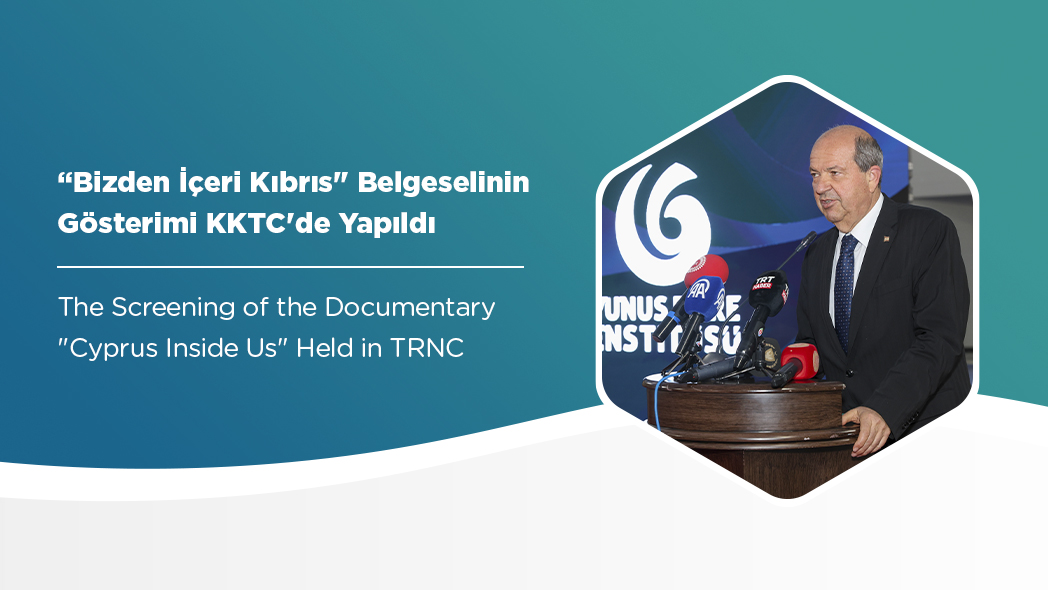"Yunus Emre and Turkish in the World"
The President of Yunus Emre Institute Prof. Şeref Ateş has participated in an interview called "Yunus Emre and Turkish in the World" at the Presidency of the Republic of Turkey Nation's Library.
An interview called "Yunus Emre and Turkish in the World" was carried out at the Presidency of the Republic of Turkey Nation's Library on June 21, 2021. The President of Yunus Emre Institute Prof. Şeref Ateş participated in the interview and talked about the place of Yunus Emre in world history, and the influence of his philosophy on Yunus Emre Institute and cultural diplomacy.
Prof. Ateş mentioned throughout the program that the foundation of the Institute was based on the philosophy of Yunus Emre and started his speech as follows:
"Before starting to talk about the activities of Yunus Emre Institute, we must first start with the essence of Yunus. Concerning science, Yunus says 'Science is to know, science is to know oneself.' Therefore, a person strives to know themselves throughout their life, throughout their journey between life and death. Hence, the lives of each of us, our careers, our deeds tell about the process that we experienced to know ourselves. Yunus Emre Institute is a public foundation that has the basic purpose of introducing Turkey, Turkish language, understanding, history, art and civilization to the world and establishing a bond between Turkey and the people of the world. The planning and execution of activities within such endeavor are carried out by Yunus Emre Institute. It is very valuable for us that this year has been declared the year of Yunus Emre. On the one hand, UNESCO declared this year as the year of Yunus Emre because of his 700th death anniversary. On the other hand, our President of the Republic of Turkey declared this year the Year of Turkish and Yunus Emre. Therefore, we aim to work harder this year and to both learn ourselves and introduce to the world this man of philosophy from Anatolia. Also, this is a year that fits well with Yunus. Because, these lands, especially Anatolia faced many difficulties during the period in which Yunus lived. On the one hand, a cultural decline, a degradation had started in Anatolia due to Mongolian invasions and struggles of Seljuk seigniorities, and on the other hand the ongoing Crusades. During the period, Yunus built a career in science on one hand and was within a process of knowing himself on the other hand."

PHILOSOPHY OF LIFE ENCOMPASSES ALL CREATION
When talking about the fact that Yunus Emre preserved his validity for every period in the Anatolian lands and started a new movement during the period in which he lived, Prof. Ateş said:
Prof. Dr. Ateş: Long before the West, Yunus had carried humanism one step further. Because humanism is based on "homo", the humankind, and thus is based on the humankind. However, Yunus went one step further. Yunus has the 'philosophy of life'. The philosophy is life is not limited to humankind, but it is to love all creation. |
"The work of Abdülbaki Gölpınarlı is one of the first about Yunus. Yunus constantly came up for 700 years in many different periods in Turkey, whether it be the Ottoman Empire or the Republic of Turkey. However, as you know, since he is a historical figure, the perspective of the onlooker, the researcher is also important. I, as a person, who is working at Yunus Emre Institute, see through my academic experience that Yunus Emre initiated the 'Renaissance of Anatolia'. Long before the West, Yunus had carried humanism one step further. Because humanism is based on 'homo', the humankind, and thus, it is based on the humankind. However, Yunus went one step further. Yunus has the 'philosophy of life'. The philosophy of life is not limited to humankind, but it is to love all creation."
Prof. Ateş mentioned that Yunus Emre not only influenced Anatolia but the entire world and said, "Yunus not only influenced Anatolia and Turks for 700 years, but he also influenced the West. When we look at the historical sources, we know that a captive Hungarian soldier or a Hungarian youth translated the poems of Yunus into Latin. Likewise, it is also possible to see the traces of Yunus in Erasmus, Rotterdam. Therefore, Yunus is a personality who goes beyond himself over his own age. As Peyami Safa says, 'Yunus was the poet of yesterday, is the poet of today, and will be the poet of tomorrow.' Therefore, he is a personality that is beyond time, space and geography. He is valuable for us in this sense."
THE PHILOSOPHY OF YUNUS IS ALSO A CURE FOR OUR CONTEMPORARY CHALLENGES
Prof. Ateş mentioned that Yunus Emre faced many difficulties during the period in which he lived and that we face great difficulties during the period in which we live. Thus, the understanding of Yunus is very important, and continued his words as follows:
"A teenager born in this age has great challenges to be able to prove themself. Yunus combines all these. Because there is plurality in unity, thought of unity, but there is also a unity in that plurality. There are differences, but all these point towards one thing. All these speak about the phenomenon of life. In this sense, Yunus is beyond his time. Another issue is that Yunus struggled with the corrupt understanding of religion during that time. This is fundamentally innovation. As far as I see it, Yunus is the Turkish of the Quran. We bring this up at Yunus Emre Institute. We say that it is culture, art and understanding. It is to establish a bond between the Turkish people and foreign people." |
"The inability to breathe is once again used as a symbol in our age, and as we know from the COVID-19 on one hand and the protests in America on the other hand, the humankind is in a difficult situation individually in our age, is unable to breathe. Inequality, injustice, wars... A teenager born in this age has great challenges to be able to prove themself. Yunus combines all these. Because there is plurality in unity, thought of unity, but there is also a unity in that plurality. There are differences, but all these point towards one thing. All these speak about the phenomenon of life. In this sense, Yunus is beyond his time. Another issue is that Yunus struggled with the corrupt understanding of religion during that time. This is fundamentally innovation. As far as I see it, Yunus is the Turkish of the Quran. We bring this up at Yunus Emre Institute. We say that it is culture, art and understanding. It is to establish a bond between the Turkish people and foreign people."
Prof. Ateş mentioned that the bond between people is established through culture and said the following:
“How will we establish this bond? With culture... What is culture? Culture is different from science. Culture is reflected in behavior, 'it is the lifestyle'. There are key features that determine this. We define it as thought, behavior, emotions and language. These four things determine our culture. The things we read within thought are what we learn. However, we have emotions on the other hand. Yunus blended these two together and called it heart. With heart, he actually means that Allah reveals himself in the heart of humankind. Therefore, every word of his came down just like mottos. We face difficulties when we simply translate Yunus Emre into foreign languages. Because he cannot be understood with a simple translation. He has quite deep meanings. So, how do we relay these? There is a cultural dimension to Yunus. The religion says, 'This is that.' The style of religion, the style of Quran is pedagogical. It speaks directly because it is the word of Allah. Quran is interpreted differently in every age. Yunus is a different interpretation of Quran both in his own period and in this period. He transformed Quran into a culture. What is culture? Yunus relayed Quran to us as a standard of living in daily life. Therefore, many who do not understand him has rejected him. Yunus also mentioned such rejection within himself. We do not know whether Molla Kasım exists or not, but Yunus also gave him his word. He also says to this character, 'Do not bend the words, another Molla Kasım will reveal himself and criticize you.'. Therefore, this is very important for Yunus."
Prof. Ateş mentioned that Yunus Emre defined the Quran as a process of four gates and expressed Yunus' thoughts as follows:
"On one hand, there is the metaphor of the gate when explaining Quran. He identifies this process in life as four gates: the gates of sharia, tariqa, marifa and haqiqa... He also expresses the psychological development of humans in seven steps. There is a nafs which we call an-nafs al-ammarah that needs to be interpreted in our age and elaborated in psychology. This is a nafs that thinks everything belongs to it, that the world revolves around it, and thus it sees itself the rightful owner of everything and collects mostly material things. Then, there is the stage of an-nafs al-luwwammah, the arrival of the human at a stage that is filled with internal conflicts. The third stage is the an-nafs al-mulhammah, the inspirations come slowly at this stage. Therefore, the poets, writers and thinkers start to write at the stage of an-nafs al-mulhammah. While this process continues, the next stage is the an-nafs al-mutma'innah, a nafs that is satisfied, relieved, more like to reach eternity. Above that, we have the stages that we call an-nafs ar-raddiyah and an-nafs al-mardiyyah, in which you are blessed by Allah and Allah is pleased by you. However, all these are the Quran. Thus, each saying of Yunus is a saying that we use as a basis at the Institute."
"PHILOSOPHY OF YUNUS EMRE IS AT THE CORE OF CULTURE DIPLOMACY”
Prof. Ateş mentioned that the philosophy of Yunus Emre constituted the core of cultural diplomacy of our age, but cultural diplomacy could not reach this stage wholistically, and said the following:
"Cultural diplomacy could only begin in the 2000s. However, in 1300s-1400s, Yunus Emre had been saying, 'Come, let us meet, let us make it easier. Let us love and be loved. This earth will be left to no one.'. This verse is the fundamental verse of cultural diplomacy in our age. Besides, cultural diplomacy could not advance that far. When we examine this saying of Yunus, we see that it is also a verse from the Quran. In the Quran, Allah says, 'We have created the humankind in tribes and nations so that they shall meet each other.'. Yunus localizes this into Turkish and transfers it to its own cultural language. In other words, he transfers it to daily language and thus everyone understands it. As Peyami Safa said, Yunus is not only the poet of yesterday, but also of today and tomorrow. Yunus seriously impacted this geography. There have also been some who wrote in the style of Yunus. Not only when we look at the Ottoman Period or great troubadours, but also the style of Âşık Veysel from the Republic of Turkey Period is also Yunusian. He also compliments the earth. He speaks with the earth. When we examine the poems of Nazım Hikmet, he also has the same plainness." |
"Cultural diplomacy could only begin in the 2000s. However, in 1300s-1400s, Yunus Emre had been saying, 'Come, let us meet, let us make it easier. Let us love and be loved. This earth will be left to no one.'. This verse is the fundamental verse of cultural diplomacy in our age. Besides, cultural diplomacy could not advance that far. When we examine this saying of Yunus, we see that it is also a verse from the Quran. In the Quran, Allah says, 'We have created the humankind in tribes and nations so that they shall meet each other.'. Yunus localizes this into Turkish and transfers it to its own cultural language. In other words, he transfers it to daily language and thus everyone understands it. As Peyami Safa said, Yunus is not only the poet of yesterday, but also of today and tomorrow. Yunus seriously impacted this geography. There have also been some who wrote in the style of Yunus. Not only when we look at the Ottoman Period or great troubadours, but also the style of Âşık Veysel from the Republic of Turkey Period is also Yunusian. He also compliments the earth. He speaks with the earth. When we examine the poems of Nazım Hikmet, he also has the same plainness. He speaks with the trees and makes the trees talk. Therefore, Yunus Emre is a great value, a universal value for us. Every year, we must re-evoke this value, re-understand the deepness of its layers. This is the main purpose of the humankind. Because all nature is connected in one way or another. Therefore, the evil you commit leaves its effect somewhere else."
YUNUS EXPLAINS THE PATH TO BECOMING HUMAN IN THE SIMPLEST WAY
"There are ten maqams in each of Yunus' four gates. The fundamental purpose of the humankind is the ask the question of why. Yunus also asks himself, 'Yunus, why have you come to this earth?' The instructor is also quite meaningful pedagogically. The instructor in the poem 'I have asked the yellow flower, do you have a mother and a father?' is a flower. Is this not a symbolic flower, does he really speak with that flower? As Yunus experienced different roles in himself psychologically, he expressed this experience in different ways in the same work. Therefore, critiques should be seen in the same manner. Especially rhetoric and oratory include hypocrisy and hubris. Therefore, he speaks very plainly. When examined, you see that he has so many critiques that he even interprets life and death as one when making sense of life. Therefore, a human is born of their mother as a person, experiences this process, and becomes a human by being born out of themselves. Not every person that is born may die as a human. Therefore, in order to be able to die as a human, Yunus set forth these maqams, these internal evolutions and developments. He sees these as very simple, plain, in-life, and when it examined as a philosophy here, he sees that everything, during the period in which he lives, is power. Thus, the oratory, the status, and the authority is power. Regarding his teachers, he even says 'The teachers who cast themselves as the prophet were too much for this people.'. In other words, he links the reason for the oppression on the people to the teachers. Christianity does not have such a critical view. The main issue in Christianity is the fact that the church is involved internally and externally with the human as a religious authority. This danger always exists in Islam. Therefore, there are two dhikrs of Yunus in our language. The first dhikr is 'I do not know'. We will empty the things that we acquired up until now in terms of thought, emotions, language and behavior with the dhikr of 'I do not know'. The second dhikr is 'La hawla wala quwwata illa billahil aliyyil azim'. Meaning that you do not have all the power. We are in front of the screen we can be under the illusion that we have a power. When we orate or when we have status, authority and money we may think that we have some power in ourselves. Therefore, it is necessary to be continuously purified of such power. These maqams, especially the maqam of haqiqa, have two gates/stages that must be reached. The first is 'to see the 72 nations in the same regard'. Therefore, cultural diplomacy carries this out with a different plan. In fact, it has a different plan, but earns the trust of people by appearing sympathetic. On the other hand, with Yunus' 'to see the 72 nations in the same regard', one must hold the people with different languages in different geographies same as oneself. Therefore, as Yunus Emre Institute, our main goal is to raise such people, to have the people in geographies we visit experience this."
ASSURING EVERYTHING THAT IS CREATED
"The second one is also very important in terms of Yunus. Again, this is a very important maqam from the perspective of human rights. Again, there is a maqam to assure everything that is created on earth. For example, we discuss issues such as women's rights and children's rights. We make each subject specific by catharizing it from its soul. Therefore, we clash them with each other in a sense. In democracies, there is a 'thesis, anti-thesis' model since Hegel. Yunus removes this by saying 'I did not come for the cause, my work is for love.'. Because when you think about a cause, there is always an anti-thesis of a thesis. When you think about politics, it also has an opposite. When you think about interests, there are counter-interests. The basic cause here is to have every creation to be assured by you. Yunus dealt with such stages. Although it was quite philosophical and deep, he expressed it with quite simple Turkish. Therefore, he also brought these within Turkish. Sayings such as 'to listen through the ears of life', 'to see through the eyes of life' are all Yunus Emre's. Although Persian and Arabic were the languages of diplomacy, politics and literature of the period, he said all these in Turkish. He added great richness and articulation to Turkish. His language and ideas on language are especially valuable and are also derived from the Quran."
"WHAT MAKES A MOTHERLAND THE MOTHERLAND IS THE CULTURE"
Prof. Ateş mentioned that Anatolian lands were molded by thinkers such as Yunus Emre and thus became the motherland and said, "The soldier protects the motherland, but what makes a motherland the motherland is the culture. Otherwise, it is just a piece of land; the culture breathes life into it. After Allah created the humankind, he blew life into the humankind from his soul. What we call the spirit is actually the meaning. Thus, we cannot think materialistically. Yunus also opposed such materialism. Even if such materialism is embodied under the name of science.".
You can watch the interview of the President of Yunus Emre Institute Prof. Şeref Ateş at the Presidency of the Republic of Turkey Nation's Library through this link:
Yunus Emre Institute YouTube channel





